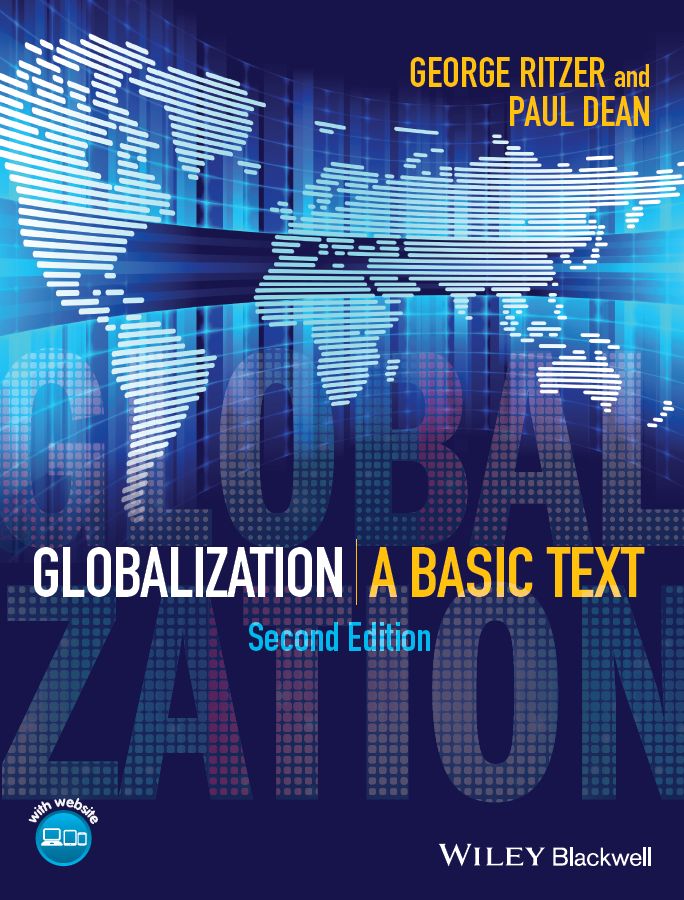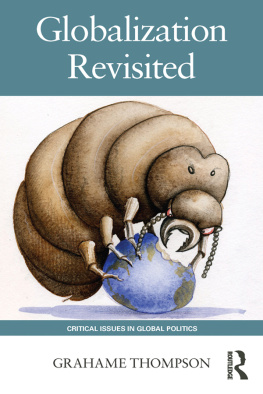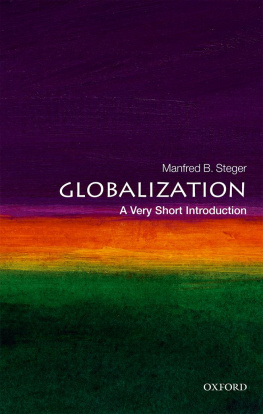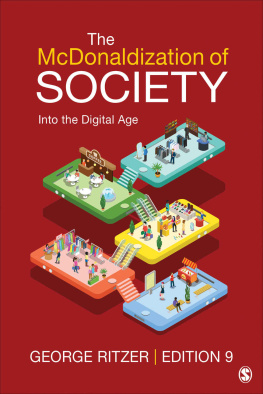
 CONTENTS
CONTENTSList of Illustrations
- Chapter 01
- Chapter 02
- Chapter 03
- Chapter 04
- Chapter 05
- Chapter 07
- Chapter 08
- Chapter 09
- Chapter 10
- Chapter 11
- Chapter 12
- Chapter 13
- Chapter 14
Guide
Pages
Also available:
The Globalization Reader, 5th Edition
Edited by Frank J. Lechner, John Boli
Globalization: The Essentials
George Ritzer
Readings in Globalization: Key Concepts and Major Debates
Edited by George Ritzer and Zeynep Atalay
The Wiley-Blackwell Encyclopedia of Globalization
(www.globalizationencyclopedia.com)
Edited by George Ritzer
The Blackwell Companion to Globalization
Edited by George Ritzer
Introducing Globalization: Ties, Tensions, and Uneven Integration
Matthew Sparke
Globalization A Basic Text
George Ritzer and Paul Dean
Second Edition
This second edition first published 2015
2015 John Wiley & Sons, Ltd
Edition history: Blackwell Publishing Ltd (1e, 2010)
Registered Office
John Wiley & Sons, Ltd, The Atrium, Southern Gate, Chichester, West Sussex, PO19 8SQ, UK
Editorial Offices
350 Main Street, Malden, MA 02148-5020, USA
9600 Garsington Road, Oxford, OX4 2DQ, UK
The Atrium, Southern Gate, Chichester, West Sussex, PO19 8SQ, UK
For details of our global editorial offices, for customer services, and for information about how to apply for permission to reuse the copyright material in this book please see our website at www.wiley.com/wiley-blackwell.
The right of George Ritzer and Paul Dean to be identified as the authors of this work has been asserted in accordance with the UK Copyright, Designs and Patents Act 1988.
All rights reserved. No part of this publication may be reproduced, stored in a retrieval system, or transmitted, in any form or by any means, electronic, mechanical, photocopying, recording or otherwise, except as permitted by the UK Copyright, Designs and Patents Act 1988, without the prior permission of the publisher.
Wiley also publishes its books in a variety of electronic formats. Some content that appears in print may not be available in electronic books.
Designations used by companies to distinguish their products are often claimed as trademarks. All brand names and product names used in this book are trade names, service marks, trademarks or registered trademarks of their respective owners. The publisher is not associated with any product or vendor mentioned in this book.
Limit of Liability/Disclaimer of Warranty: While the publisher and authors have used their best efforts in preparing this book, they make no representations or warranties with respect to the accuracy or completeness of the contents of this book and specifically disclaim any implied warranties of merchantability or fitness for a particular purpose. It is sold on the understanding that the publisher is not engaged in rendering professional services and neither the publisher nor the author shall be liable for damages arising herefrom. If professional advice or other expert assistance is required, the services of a competent professional should be sought.
Library of Congress Cataloging-in-Publication Data
Ritzer, George.
Globalization: a basic text / George Ritzer and Paul Dean. Second edition.
pagescm
Includes bibliographical references and index.
ISBN 978-1-118-68712-3 (pbk.)
1.Globalization.I.Title.
JZ1318.R577 2015
303.482dc23
2014029766
A catalogue record for this book is available from the British Library.
Cover image: World map Derrrek / iStockphoto, Background dot patten Maria Kazanova / Shutterstock
To Bodhi Axel Ritzer, With Much Love and Great Hope
for a Better World in Your Future
(GR)
To Tia Shields Dean, My Wonderful and Caring Wife who has Helped to Make
this Book and so Much More Possible
(PD)

ABOUT THE WEBSITE
The Globalization: A Basic Text, Second Edition, companion website includes a number of resources created by the author that you will find helpful.
www.wiley.com/go/ritzer/globalization

FOR STUDENTS
- Student Study Guide
- Chapter Summaries
- Additional Readings
- Website Links
- Discussion Questions
- Additional Questions

FOR INSTRUCTORS
- Teaching Notes
- Discussion Question Answer Frames
- Additional Question Answer Frames
- PowerPoint Teaching Slides

FIGURES
| Transportation routes |
| Airline passenger volume |
| Mobile-cellular subscriptions |
| Global English |
| The top 50 billionaires |
| World areas of recurrent conflict |
| Trade flow |
| The domains of the major religions |
| Spread of computer virus |
| The world divided: core and periphery in the early twenty-first century |
| Coastline at 10 meters |
| Global water risk |
| Malaria |
| World metro population |
| Cities powering globalization |
| Serbia and its neighbors |
| World maternal mortality |
| Legality of homosexual acts |
| Enfranchisement of women |

PREFACE
As we revise this preface in July, 2014, we are struck by how much the events of the day both reflect, and are profoundly changing, the process of globalization. For example, we write this only hours before watching Lionel Messi and Argentina take on the Netherlands in the World Cup the most famous global sporting event. Football (or soccer, as it is known in the United States) is the most played and most watched sport around the world. Football fandom also reflects a global culture and, with FIFA as its governing body, it has a global organizational structure.
It has been particularly fascinating to watch global events unfold as we were writing the second edition of this book. For instance, the first edition was published in the midst of the Great Recession. The ways in which economic processes (e.g. mortgage failures, credit freezes, the failure of legendary financial firms and banks), largely originating in the US, flowed around the world in relatively short order was breathtaking. As the crisis deepened and widened, political unrest grew, and the future of the global economy was uncertain. As of this writing, the global economy has stabilized but it has not yet rebounded to its pre-recessionary levels for many Americans and for many others in most parts of the world. A great number of scholars and activists argued that it was neoliberal policy (see ) that led to the Great Recession, and as the economic turmoil wore on, some predicted its demise. Now, having emerged from the Great Recession, it is clear that neoliberalism remains a strong force in both global politics and the global economy.
Next page









 CONTENTS
CONTENTS